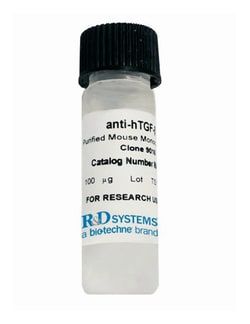Mouse Angiopoietin-like 2 Antibody, R&D Systems™
Rat Monoclonal Antibody
Manufacturer: Fischer Scientific
The price for this product is unavailable. Please request a quote
Antigen
Angiopoietin-like Protein 2/ANGPTL2
Concentration
LYOPH
Applications
Western Blot
Conjugate
Unconjugated
Host Species
Rat
Target Species
Mouse
Gene Accession No.
Q9R045
Gene ID (Entrez)
23452
Immunogen
E. coli-derived recombinant mouse Angiopoietin-like 2 Pro23-His493 Accession # Q9R045
Primary or Secondary
Primary
Reconstitution
Reconstitute at 0.5 mg/mL in sterile PBS.
Test Specificity
Detects mouse Angiopoietin-like 2 in direct ELISAs and Western blots. In direct ELISAs, this antibody shows 100% cross-reactivity with recombinant human (rh) Angiopoietin-like 2 but no cross-reactivity with rhAngiopoietin-1, -2, -4, rmAngiopoietin-3, rhAngiopoietin-like 1, or rhAngiopoietin-like 7.
Clone
200001
Dilution
Western Blot 1 ug/mL
Classification
Monoclonal
Form
Purified
Regulatory Status
RUO
Formulation
Lyophilized from a 0.2 μm filtered solution in PBS with Trehalose. *Small pack size (SP) is supplied as a 0.2 μm filtered solution in PBS. with No Preservative
Gene Alias
angiopoietin-like 2, Angiopoietin-like protein 2, angiopoietin-related protein 2, ANGPTL2, ANGRP2, ARP2HARP, MGC8889
Gene Symbols
ANGPTL2
Isotype
IgG2a
Purification Method
Protein A or G purified from hybridoma culture supernatant
Content And Storage
Use a manual defrost freezer and avoid repeated freeze-thaw cycles.12 months from date of receipt, -20 to -70 degreesC as supplied. 1 month, 2 to 8 degreesC under sterile conditions after reconstitution. 6 months, -20 to -70 degreesC under sterile conditions after reconstitution.
Description
- Angiopoietin-like Protein 2/ANGPTL2 Monoclonal specifically detects Angiopoietin-like Protein 2/ANGPTL2 in Mouse samples
- It is validated for Western Blot.
